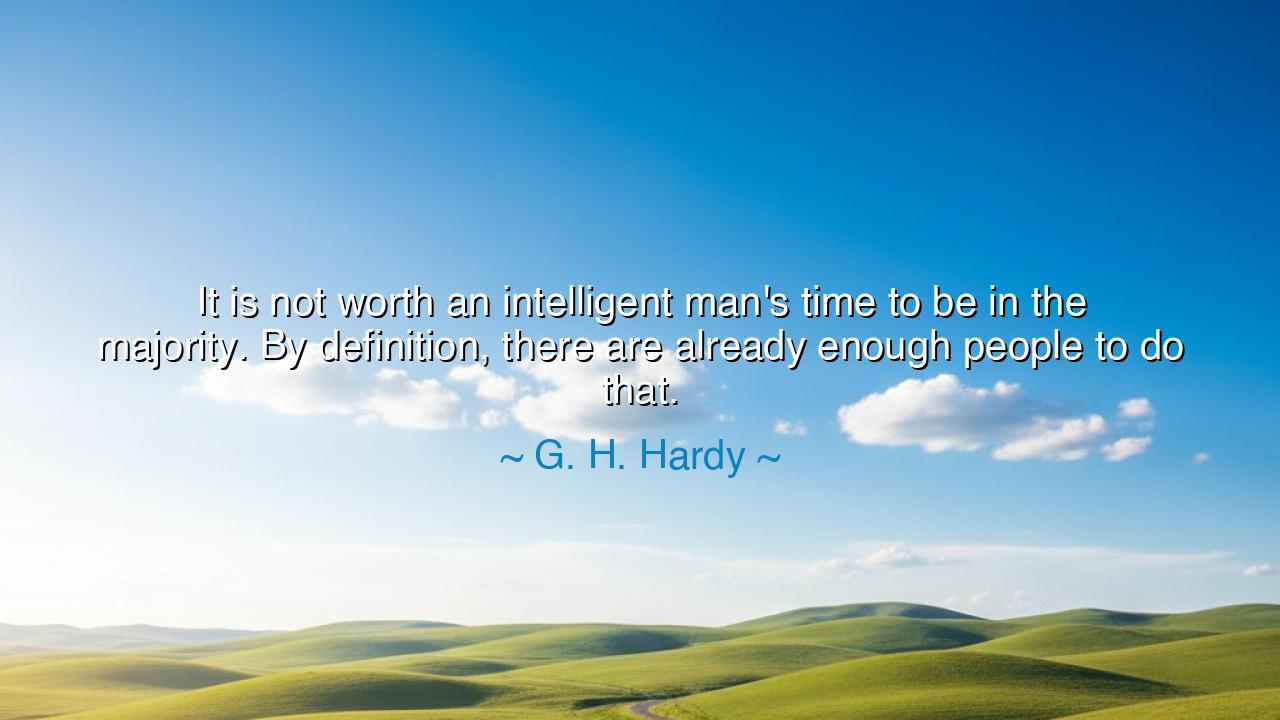
It is not worth an intelligent man's time to be in the majority.
It is not worth an intelligent man's time to be in the majority. By definition, there are already enough people to do that.






The Courage of the Independent Mind
From the discerning intellect of G. H. Hardy, the great mathematician and philosopher of thought, comes this bold declaration: “It is not worth an intelligent man's time to be in the majority. By definition, there are already enough people to do that.” These words, both ironic and profound, strike at the very heart of conformity. They remind us that the path of intelligence is not the crowded road, but the narrow and often lonely one—the way of the thinker, the creator, and the visionary who dares to see beyond the comfort of agreement. In Hardy’s voice we hear the echo of an ancient truth: that the pursuit of truth, of knowledge, of excellence, demands the courage to stand apart.
The meaning of this quote lies in the sacred value of independent thought. To be “in the majority” is to dwell in safety, to find comfort in numbers, to let the thinking of others substitute for one’s own. But to the intelligent man—the seeker, the philosopher, the artist—this is not enough. His task is not to echo the world, but to question it; not to follow, but to forge. Hardy reminds us that if most men agree upon something, then its defense is already secure; the thinker must instead turn his mind to what lies unexplored, unchallenged, unseen. The true measure of intelligence is not in how well one conforms, but in how bravely one departs from the crowd in search of truth.
The origin of this thought can be found in Hardy’s own life and character. As a mathematician, he lived not for fame or politics, but for the pure pursuit of beauty and understanding. He shunned the popular and the practical, choosing instead to dwell in the abstract realm of numbers and ideas. In a world consumed by utility, Hardy sought truth for its own sake, declaring that mathematics, like art, is valuable not for what it produces, but for what it reveals. His words arise from this same spirit of intellectual defiance—the conviction that the majority follows comfort, while the few pursue clarity. To think freely, he believed, is to reject the applause of the many in favor of the approval of reason.
Throughout history, the greatest minds have embodied this principle. Consider Galileo Galilei, who stood alone before the power of Church and empire, daring to declare that the Earth moved around the Sun. The majority mocked him, condemned him, even forced him to recant—but the truth he bore eventually conquered the world. Or think of Socrates, who chose death rather than betray his devotion to questioning and truth. The majority, blinded by fear and tradition, could not tolerate his wisdom. Yet it is Socrates, not his accusers, who lives on in the memory of civilization. In every age, it is the minority of the courageous and intelligent who have pulled humanity forward while the multitude clung to the past.
But Hardy’s wisdom is not merely a celebration of rebellion; it is a reminder of responsibility. To stand apart is not to be contrary for its own sake, but to be devoted to truth even when it isolates you. The independent thinker must not reject the majority from pride, but from principle. His solitude must be born not of arrogance, but of integrity. To think freely is to accept the burden of loneliness, for the world often mistrusts what it does not understand. Yet, as Hardy implies, this burden is the very mark of intellectual honor—to labor where others fear to tread, to speak what others dare not say, to seek what others overlook.
The ancients knew this path well. Heraclitus said, “The many live as though asleep, but the wise awaken.” The thinker who awakens cannot return to the slumber of the masses; his eyes, once opened, see differently forever. To follow the crowd may bring peace, but it also brings mediocrity. To stand apart may bring struggle, but it leads to immortality of spirit. The mind that thinks alone is often the one that sees furthest. The prophet, the poet, the scientist—they all begin as outcasts, dismissed by the world they will one day change.
Therefore, O seeker of truth, take this counsel: do not fear to stand alone. If your heart burns with conviction and your reason lights the path, follow it, even when the road is empty. Let others seek comfort in the company of the many; you must seek truth in the solitude of thought. Guard your independence as a sacred flame—feed it with knowledge, protect it with humility, and share its light with courage. For it is through the few who think deeply and dare greatly that the world is renewed.
And when doubt whispers to you that it is safer to agree than to stand apart, remember Hardy’s wisdom: the majority already has enough defenders. The world does not need more voices that echo—it needs minds that question, hearts that believe, and souls that create. Be among the few who shape the future rather than follow it. For though the crowd may forget your name, truth will remember it—and in that remembrance, your spirit shall live forever.






AAdministratorAdministrator
Welcome, honored guests. Please leave a comment, we will respond soon